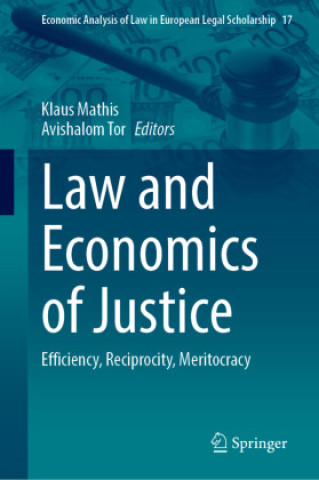
Kód: 45116977
Law and Economics of Justice
Autor Klaus Mathis, Avishalom Tor
While previous volumes have examined specific issues and developments such as the coronavirus crisis or digital transformation from a law and economics perspective, the anniversary edition returns to the methodological and philoso ... celý popis
- Jazyk:
 Angličtina
Angličtina - Vazba: Pevná
- ISBN-13: 9783031568213
Nakladatelství: Springer, Berlin, 2024
- Více informací o knize

5985 Kč

Skladem u dodavatele v malém množství
Odesíláme za 12-17 dnů
Potřebujete více kusů?Máte-li zájem o více kusů, prověřte, prosím, nejprve dostupnost titulu na naši zákaznické podpoře.
Přidat mezi přání
Mohlo by se vám také líbit
-

Dune
262 Kč -

Haunting Adeline
617 Kč -

Berserk Deluxe Volume 2
1050 Kč -

White Nights
90 Kč -

Powerless
259 Kč -

Atomic Habits
340 Kč -

Dune Messiah
178 Kč -

Berserk Deluxe Volume 3
1138 Kč -

One Day
276 Kč -

Berserk Deluxe Volume 1
1033 Kč -

Iron Flame
353 Kč -

Surrounded by Idiots
256 Kč -

Harry Potter and the Prisoner of Azkaban (Minalima Edition)
688 Kč -

Gravity Falls Journal 3
440 Kč -

Heaven Official's Blessing: Tian Guan Ci Fu (Novel) Vol. 1
426 Kč -

The Creative Act
540 Kč -

Dune
214 Kč -

Hunting Adeline
633 Kč -

A Little Life
259 Kč -

Children of Dune
174 Kč -

Heaven Official's Blessing: Tian Guan Ci Fu (Novel) Vol. 2
441 Kč
Dárkový poukaz: Radost zaručena
- Darujte poukaz v libovolné hodnotě a my se postaráme o zbytek.
- Poukaz se vztahuje na celou naši nabídku.
- Elektronický poukaz vytisknete z e-mailu a můžete ihned darovat.
- Platnost poukazu je 12 měsíců od data vystavení.
Více informací o knize Law and Economics of Justice
Nákupem získáte 599 bodů
 Anotace knihy
Anotace knihy
While previous volumes have examined specific issues and developments such as the coronavirus crisis or digital transformation from a law and economics perspective, the anniversary edition returns to the methodological and philosophical fundament of the discipline of law and economics. The present book aims to examine these foundations in general and, in particular, efficiency, reciprocity and meritocracy, and their relation to law and justice from an interdisciplinary perspective.Efficiency: Traditionally, the economic analysis of law has been guided by the goal of efficiency. Economists usually define efficiency as Pareto or Kaldor-Hicks efficiency. Any change that makes one member of society better off without anyone else being worse off is a Pareto improvement. A change is a Kaldor-Hicks improvement if the gainers value their gains more than the losers value their losses, with only hypothetical compensation required.Reciprocity: Economists have traditionally based their models on the self-interest hypothesis of homo oeconomicus. In this model, an individual maximises his own utility without being altruistic or jealous. Behavioural economics challenges the self-interest hypothesis. In fact, many people deviate from purely self-interested behaviour. There are also signs that considerations of fairness and mutual benefit are important in bilateral negotiations and in the functioning of markets. Meritocracy: The concept of meritocracy refers to a system, organisation, or society in which people are selected and promoted to positions of success, power, and influence on the basis of their abilities and merits. This means that an individual is able to climb the social ladder through hard work. Moreover, meritocracy directs the most talented people into the most functionally important positions, thereby increasing a society's efficiency. However, the equalising function of meritocracy has been criticised. Rather than reducing inequality, meritocracy is seen as the cause of racial, economic and social inequality.
 Parametry knihy
Parametry knihy
Zařazení knihy Knihy v angličtině Law International law Public international law
5985 Kč
- Plný název: Law and Economics of Justice
- Podnázev: Efficiency, Reciprocity, Meritocracy
- Autor: Klaus Mathis, Avishalom Tor
- Jazyk:
 Angličtina
Angličtina - Vazba: Pevná
- EAN: 9783031568213
- ID: 45116977
- Nakladatelství: Springer, Berlin
- Rozměry: 235 × 155 mm
- Datum vydání: 07. June 2024
Osobní odběr Praha, Brno a 12903 dalších
Copyright ©2008-24 nejlevnejsi-knihy.cz Všechna práva vyhrazenaSoukromíCookies


 Vrácení do měsíce
Vrácení do měsíce 571 999 099 (8-15.30h)
571 999 099 (8-15.30h)